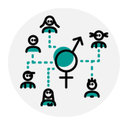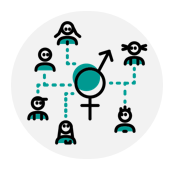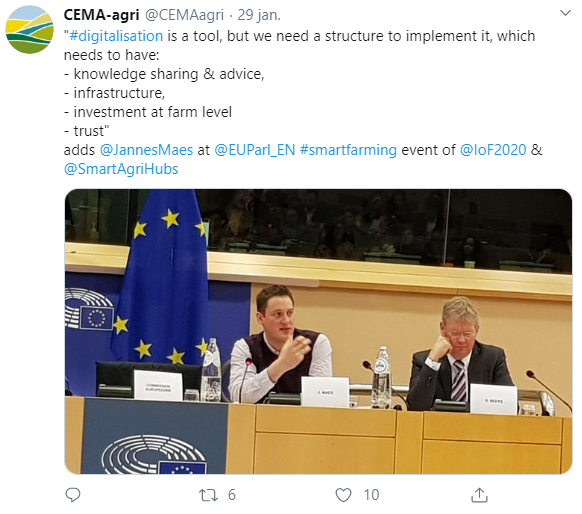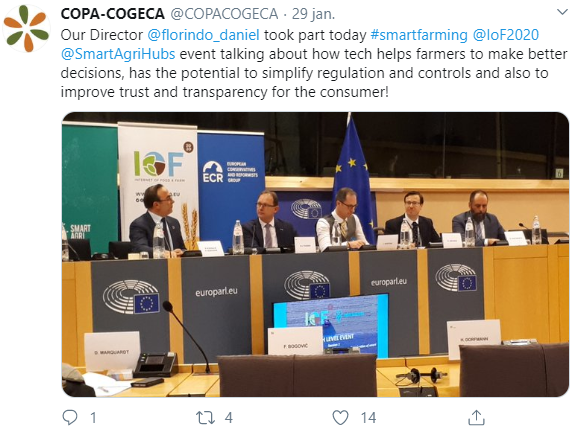Subscribe to
our newsletter
subscribe
News corner
Find out the latest news from our Community here!
The ‘IoT Catalogue’
The IoT Catalogue is a web repository of knowledge and technology on the Internet-of-Things (IoT) aimed at helping users (developers/integrators/advisors/end-users) to develop their projects, learn from others’ innovations, share technological solutions, communicate experiences and much more.
read more
The SmartAgriHubs Video Contest!
As part of our annual SmartAgriHubs Stakeholder Conference, the SmartAgriHubs team had organised a video contest open for our Digital Innovation Hubs, Competence Centers and Flagship Innovation Experiments. However, following the postponement of our Stakeholder Conference due to the growing concerns over the COVID-19 pandemic affecting us globally, our video competition was also postponed.
We would like to use this space to extend our thanks to all the participants who sent us their submissions, each better than the other. Further, we would like to announce that we have decided to hold the competition online! Details will follow on the SmartAgriHubs website and Social Media channels as to how it will be held.
In light of these developments, we would like to encourage any Digital Innovation Hub, Competence Center or Flagship Innovation Experiment that still wishes to do so, to send us your video. We, at SmartAgriHubs, certainly look forward to receiving more contributions. You can check out the submissions here!
29th of January
High-Level Event on Smart Farming in the European Parliament
On the 29th of January, SmartAgriHubs and Internet of Food and Farm 2020 organised a high-level event in the European Parliament named ‘Smart Farming: Digitalisation of Agriculture and Vision for the CAP’. The event was a success and started an engaging discussion about the place of Smart Farming in the new CAP.
read more

Gender task force in SmartAgriHubs and IoF2020
Digitisation of agriculture holds hopes for ambitious improvements in
more sustainable value chains, sector resilience and competitiveness, coupled with innovation from top to bottom. Digital skills and digital competence are needed by citizens to participate and thrive, to be socially included, and to enjoy employability and economic growth. However, the future of women, particularly rural women in an ICT-oriented or digitised agriculture is unclear. In this respect, the SmartAgriHubs and IoF2020 projects are committed to the principle of equality between women and men, enshrined as one of the European Union’s core values in the Lisbon Treaty (Articles 2 and 3 of the EU Treaty). With this objective in mind, a joint task force on gender balance was created to bring focused attention to this issue, moving it into the spotlight and placing it at the centre of efforts to achieve gender equality and women’s empowerment. The gender task force will work in two main groups, communication and analysis, and an action plan will be shared with the consortium partners.
In the meantime, we are looking for ideas and thoughts from you, our community. So please share with us your experiences and activities in your own organisation or project related to gender balance. Write us an email at communications@smartagrihubs.com

Postponement of the SmartAgriHubs Stakeholder Conference
It is with great regret that due to the increasing concerns about the spread of covid-19, SmartAgriHubs had to decide to postpone its Bucharest Conference, which would have been held at the Radisson Hotel in Bucharest from the 9th of March.
We are very sorry for any inconvenience that this may have caused, but we are sure you will agree that the health and safety of our members, participants and all those involved, must be our highest priority.
The conference will be rescheduled at a later date to be determined.
Important practical information
All registered participants who have paid the 100€ in catering costs shall be reimbursed these catering costs in full. This reimbursement shall be done automatically on the credit card number that was used during registration.
On behalf of the organisation team we thank you for your understanding.
30 August - 1 September 2019
News update from Work Package 6
In a project like SmartAgriHubs with many partners and data exchange between them, potential ethical issues can arise. You can think of issues like surveillance, transparency and data sharing. Also a fair distribution of benefits and power, and the distribution of responsibility and liability can lead to ethical questions. As many innovators have a background in ICT, or in farming or a farming-related business, it is not always easy for them to become aware of the ethical questions that come forwards and deal with them appropriately. To provide guidance on these issues, the project SAH has appointed an Ethics Advisory Board (EAB). This board consists of George Beers (chair), Simone van der Burg (ethics expert), Bojan Gavrilović (practical expert), and Hennie van der Veen (Secretary). The EAB has a number of responsibilities. First of all, we will provide you with information (e.g. training, core values, documents) through the Innovation Portal and during partner events. Secondly, the EAB can be consulted for any ethical questions concerning data collection or any other ethical issues that might arise. And in case it is foreseen that the data collection concerns trials or experiments on human beings or animals, the EAB has to give ethical clearance. You can contact the EAB through Hennie.vanderveen@wur.nl.
We all hope to meet you later this year in Bucharest where interactive workshops on ethics will be organized!
RC Central Europe WIRELESSINFO
Regional Cluster Central Europe WIRELESSINFO is currently preparing and installing their Digital Innovation Hub solution for two new partners. Curious about these solutions? Find out reading their article here.
read more
Here is a selection of popular tweets from our Community from over the past few months! Do you want to feature here in the next newsletter? Make sure to tag us at @SmartAgriHubs.


Follow us on social media
Did you know? There are more than 3.000 followers across all our social media channels.
Will you help us reach 4K? Give us a follow on our accounts to stay involved with the SmartAgriHubs community!


This project has received funding from the European Union’s Horizon 2020 research and innovation programme under grant agreement Nº 818182.
Do you have news you want to have featured in the next newsletter?
Click here
High-Level Event on Smart Farming in the European Parliament
On the 29th of January, SmartAgriHubs and Internet of Food and Farm 2020 organised a high-level event in the European Parliament named ‘Smart Farming: Digitalisation of Agriculture and Vision for the CAP’.
The ECR MEP Bert-Jan Ruissen welcomed everyone wholeheartedly, before introducing the panellists of the first session on EU Agriculture and the role of digitalisation in the EU agricultural and food challenges. In his address, Mr. Ruissen introduced the attendees not only to the subject, but situated it as well, in the potential for the renewed CAP, the European Green Deal, and the Farm-to-Fork strategy. With this strategy, the EU aims to create a food-and-farm chain that is more transparent, sustainable, and competitive. Joel Bacquet, programme officer at DG CNECT, highlighted the importance of the need farmers have or will have, of Decision Support Systems, in order to help them in their decisions. He mentioned the importance of proactive detection of crop diseases digitally. SmartAgriHubs pushes this innovation in rural areas through the Digital Innovation Hubs. This is an important role for Public Policy, he posed. Edwin Hecker broke the conversation wider than the running projects, or the farmer’s viewpoint, linking the environmental, social and technological developments of the projects to the Sustainable Development Goals, and stating the smart farming and IoT can be detrimental in reaching these goals. The discussion went quite a bit further still, than just the direct influence on farming as Eduardo Cuoco stated: ‘how do we make sure that digitalisation does not leave anyone behind?’, combining the challenges of agricultural output with the challenges of keeping agriculture competitive enough for both large, and spall players to be able to compete
The second session of the morning discussed the role of data management and how to enhance the adoption of smart farming technologies. Chaired by Petros Kokkalis MEP, the discussion again, went further than the projects, which was very interesting to see develop indeed. Touching upon the role of data trust, traceability of data, and the pressing issue of lack of access to technology and connectivity in rural areas, the panel gave a varied view on the current struggles. CEMA Technical Director Ivo Hostens shared the industry’s views on the role of data management, stating that the industry is working on easy, secured brand independent data sharing by developing an open-source interface. Embedding a code of conduct on this data sharing, was agreed by the panellists a next step in the development of the digital economy in agriculture. Daniel Azevedo, director of Commodities, Trade, and Technology at Copa Cogeca, saw a challenge in the growing pressure on the productivity of farmers without the access to technology that would help them. Technology could also, said Azevedo, help farmers to know what exactly it is the consumer wants, as well as showcase the farmers themselves, allowing for full transparency in the farm-to-fork supply chain, which would change consumer behaviour.
The third session used the time well, however, in its riveting discussion on the long-term vision for EU agriculture, CAP reform and the place for smart farming. In that topic, the discussion mainly situated itself around the question of how EU citizens will benefit from these developments. Norbert Lins, MEP and chairman of the committee on Agriculture and Rural Development, lent us his chairing skills for this session. George Beers was the first voice to be heard. He is the project coordinator of both SmartAgriHubs, and IoF2020. He talked about the uncertainties surrounding digitalisation and the profound changes they are to bring with them. This, argued Beers, is to be the case for all sectors, not just agriculture. The new amounts of data to come from these developments in this new economy, should foster the development of new competences to interpret them. Beers also touched upon a sore point, often swept under the rug in these debates, which was the sheer gender imbalance, with Doris Marquadt, programme officer at the European Commission, being the only woman on stage during all three sessions. Beers said: ‘We need to address things like gender, we are missing opportunities if we do not address these issues.’. Proof of this statement was shown by Marquadt herself in her identifying of the need for aligned technological and political developments. ‘It is important that the various policy instruments go hand in hand with the digital transformation’, thus stated Marquadt. She went on to discuss the role of digitalisation in both the new Common Agricultural Policy, and the potential alignment with the European Green Deal.
The event came to a close around noon, with the closing remarks of Bert-Jan Ruissen: ‘Smart farming is high on the EU agenda, and the European Parliament is ready to further implement these developments’.
The ‘IoT Catalogue’
What are the main features of the ‘IoT Catalogue’ ?
The ‘IoT Catalogue’ is an online explorer of innovations in IoT applications and technologies. It enables to learn about a wide set of IoT use-cases and their validations. To facilitate searching for the most relevant results, the catalogue includes a detailed characterisation with respect to value propositions, ICT problems, functions, targets, domains, etc., but also to pick & chooses IoT technologies ranging from complete end-to-end solutions to tools or components/parts.
How does it relate to the Smart Farming and Food Security domain ?
Smart Farming and Food Security is a main application domain supported by the ‘IoT Catalogue’. Presently, several use cases (and its technologies) are included in the tool that have been facilitated by the IoF2020 project (www.iof2020.eu) covering the arable, dairy, fruit, vegetables and meat sectors. The ‘IoT Catalogue’ has been an essential tool for synergies’ analyses and for promoting reusability of technologies across different use cases, sectors or even domains; but also a key instrument to outreach the results (e.g. pilots, technologies, etc.) of the project.
How does the ‘IoT Catalogue’ connect with SmartAgriHubs?
The ‘IoT Catalogue’ is part of the ‘Iberian Irrigation Portal’ Flagship Innovation Experiment (FIE22), which is developing an online portal for assisting Iberian farmers to perform an optimal management of irrigation from a technical, economic and environmental point of view. The ‘IoT Catalogue’ is being used to create a competences’ catalogue with experts on Irrigated Agriculture digitisation and to showcase validated solutions/technologies (IoT devices, IoT platforms, software algorithms, etc.) for the irrigated agriculture domain.
FOODIE SmartAgrihub
Social space for smart farming
The purpose of AgriHub is to design and develop an intelligent agricultural innovation center – the digital innovation hub. The platform is designed to create links between people, companies, researchers and other entities with the knowledge and technology that will help realize innovative projects and ideas.
One of the principles is to connect common users with developers and researchers - creating a community portal. The second principle is the integration of demo applications where users, developers and researchers will have the opportunity to collaborate, build and test different solutions. For this purpose, a development and testing environment is prepared. Such created experiments will be presented to other users.
We are currently preparing and installing our Digital Innovation Hub solution for two new partners.
The first one is the Polirural Digital Innovation Hub which will provide four distinctive sections, or spaces, that cater for both internal and external users. These sections include an interaction space with forums, dialogue and Wiki capabilities to support stakeholder interaction. Second, it provides a learning space for Massive Open Online Courses to facilitate dissemination and uptake of knowledge and methodology developed through the project. Next to that, it includes an experimentation space for testing analytics and visualization including text mining and system dynamics based on real data. It also provides a development and hosting space for creating virtual instances of the shared reference to be used by each pilot when developing their applications.
Our second solution is the Smart Afri Hub Digital Innovation Hub which will be the main Information and Communication Technology (ICT) for interactive knowledge sharing and will host all results generated by the project. The Innovation Hub will act as a gateway for activities, creating innovative tools aimed at making rural areas and professions more attractive.
We have already prepared a series of webinars for both Digital Innovation Hubs where the smartagrihub.eu project is also promoted.